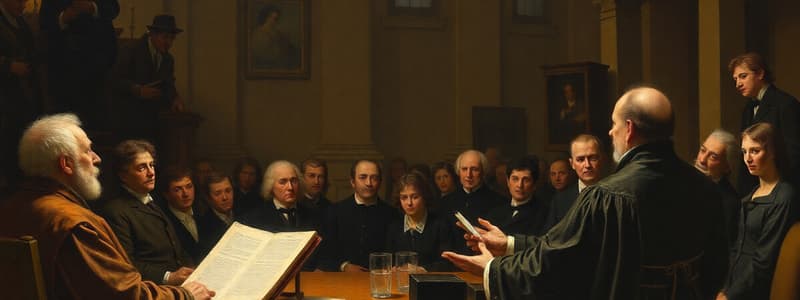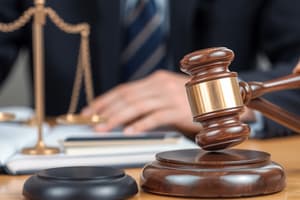Podcast
Questions and Answers
What role does a prosecutor play in relation to evidence in court?
What role does a prosecutor play in relation to evidence in court?
- The prosecutor presents admissible and relevant evidence. (correct)
- The prosecutor must determine the innocence of the defendant.
- The prosecutor decides the outcome of the case.
- The prosecutor exclusively handles character evidence.
Under what condition is a previous consistent statement admissible?
Under what condition is a previous consistent statement admissible?
- When it supports the witness's credibility due to allegations of recent fabrication. (correct)
- When it contradicts a witness's previous testimony.
- When it provides character evidence for the witness.
- When it serves as direct evidence of the accused's guilt.
Why is similar fact evidence generally regarded as inadmissible?
Why is similar fact evidence generally regarded as inadmissible?
- It directly correlates with the case at hand.
- It helps establish the defendant's character.
- It may confuse the jury regarding the current offense. (correct)
- It is always relevant to the facts in issue.
What is the fundamental principle of the law of evidence?
What is the fundamental principle of the law of evidence?
What is the status of hearsay evidence in court?
What is the status of hearsay evidence in court?
What must a party demonstrate for character evidence to be admissible?
What must a party demonstrate for character evidence to be admissible?
What is a key requirement for any evidence presented in court?
What is a key requirement for any evidence presented in court?
What is the outcome if evidence is deemed irrelevant in a legal proceeding?
What is the outcome if evidence is deemed irrelevant in a legal proceeding?
Under Section 195 of the CPA, which statement accurately describes the compellability of a spouse as a witness for the prosecution?
Under Section 195 of the CPA, which statement accurately describes the compellability of a spouse as a witness for the prosecution?
In which scenario must a spouse testify as a compellable witness for the prosecution?
In which scenario must a spouse testify as a compellable witness for the prosecution?
What happens if a spouse decides to testify even though they cannot be compelled to do so?
What happens if a spouse decides to testify even though they cannot be compelled to do so?
Which of the following offences would NOT compel a spouse to testify against the other?
Which of the following offences would NOT compel a spouse to testify against the other?
Which statement about a spouse's testimony in cases involving children is true?
Which statement about a spouse's testimony in cases involving children is true?
Which of the following statements regarding compellability and competency of witness spouses is FALSE?
Which of the following statements regarding compellability and competency of witness spouses is FALSE?
Which legislative act does Section 195 of the CPA reference concerning offences against children's care?
Which legislative act does Section 195 of the CPA reference concerning offences against children's care?
What is the role of a spouse in relation to providing evidence for the prosecution?
What is the role of a spouse in relation to providing evidence for the prosecution?
Under what circumstances is caution unnecessary when evaluating evidence from a witness?
Under what circumstances is caution unnecessary when evaluating evidence from a witness?
What is a common perception regarding the reliability of complainants in sexual assault cases?
What is a common perception regarding the reliability of complainants in sexual assault cases?
What role does a judge or magistrate have concerning evidence in a case they are presiding over?
What role does a judge or magistrate have concerning evidence in a case they are presiding over?
What is essential for the burden of proof in criminal cases?
What is essential for the burden of proof in criminal cases?
What has been suggested about the application of cautionary rules in sexual misconduct cases?
What has been suggested about the application of cautionary rules in sexual misconduct cases?
What constitutes a recalcitrant witness?
What constitutes a recalcitrant witness?
In what scenario can a magistrate testify about a confession?
In what scenario can a magistrate testify about a confession?
What is the maximum imprisonment that can be imposed on a recalcitrant witness for offences not listed in Part III of Schedule 2?
What is the maximum imprisonment that can be imposed on a recalcitrant witness for offences not listed in Part III of Schedule 2?
What must not be used to persuade a child to testify?
What must not be used to persuade a child to testify?
What does Section 4 of the Magistrates Court Act state regarding charge sheets?
What does Section 4 of the Magistrates Court Act state regarding charge sheets?
Which of the following statements aligns with the court's approach to a witness who presents a 'just excuse' for non-cooperation?
Which of the following statements aligns with the court's approach to a witness who presents a 'just excuse' for non-cooperation?
In which circumstance can a witness be considered to have a just excuse for not testifying?
In which circumstance can a witness be considered to have a just excuse for not testifying?
What legal representation is entitled to a witness exhibiting recalcitrance?
What legal representation is entitled to a witness exhibiting recalcitrance?
What may occur if a witness continues to refuse cooperation after the initial warning?
What may occur if a witness continues to refuse cooperation after the initial warning?
What is the common law rule regarding cross-examination of one’s own witness?
What is the common law rule regarding cross-examination of one’s own witness?
Which case established that a 'just excuse' is broader than a mere legal excuse?
Which case established that a 'just excuse' is broader than a mere legal excuse?
What is the primary objective of re-examination according to the legal provision?
What is the primary objective of re-examination according to the legal provision?
In the context of cross-examination, what implication does the failure of State counsel to specifically challenge an exculpatory fact have?
In the context of cross-examination, what implication does the failure of State counsel to specifically challenge an exculpatory fact have?
What is required if a legal representative wishes to address new matters during re-examination?
What is required if a legal representative wishes to address new matters during re-examination?
Which case emphasized that re-examination is not merely a privilege but a statutorily entrenched legal right?
Which case emphasized that re-examination is not merely a privilege but a statutorily entrenched legal right?
In the context of re-examination, what can it often serve as a mechanism for?
In the context of re-examination, what can it often serve as a mechanism for?
What misconception might one have regarding the challenges State counsel makes during cross-examination?
What misconception might one have regarding the challenges State counsel makes during cross-examination?
What should be done if cross-examination creates a wrong impression of a witness's evidence?
What should be done if cross-examination creates a wrong impression of a witness's evidence?
How can re-examination contribute to the judicial process?
How can re-examination contribute to the judicial process?
Flashcards are hidden until you start studying
Study Notes
The Impact of the Law of Evidence on the Presentation of Evidence in Court
- The Law of Evidence dictates admissibility of evidence in court.
- Evidence must be relevant to the facts at issue.
- Previous Consistent Statements generally inadmissible unless recent fabrication is claimed.
- Similar fact evidence inadmissible as it is not relevant to a specific crime.
- Character Evidence deemed irrelevant & inadmissible unless proven relevant.
- Hearsay evidence generally inadmissible as witnesses must testify about personal experiences.
Spouses as State Witnesses
- In criminal proceedings, a spouse is competent but not compellable to testify against the other spouse.
- A spouse may choose to testify for the prosecution, after being informed about their right not to be compelled.
- Specific exceptions exist where spouses are compellable to testify for the prosecution, including offenses against the person of either spouse or their children, offenses related to child care, maintenance violations, bigamy, incest, abduction, sexual offenses, perjury related to judicial proceedings, and making false statements in affidavits.
Cautionary Rules and Child Witnesses
- Caution should be exercised when assessing children’s testimony in cases of sexual misconduct, but no statutory requirement exists for corroboration.
- Cautionary approaches should be applied, but cautionary rules based on gender stereotypes are deemed outdated.
- No encouragement or threats should be used to persuade a child to testify.
Judicial Officers as State Witnesses
- Judges or magistrates are generally incompetent witnesses in cases they preside over, maintaining objectivity.
- Exceptions exist for formal matters, like clarifying endorsements on charge sheets, or testifying in a trial-within-a-trial regarding the voluntariness of confessions.
Legal Representatives / Prosecutors as State Witnesses
- A witness refusing to take the oath or answer questions without justification is considered recalcitrant.
- Such witnesses are entitled to legal representation and should be warned in terms of Section 189 of the Act 51 of 1977.
- If no just excuse is offered, the court may impose imprisonment for up to 2 years or 5 years for certain offenses.
- The process can be repeated if the witness remains recalcitrant.
Hostile Witnesses
- A party may not cross-examine their own witness unless they are impeached.
- When cross-examining an accused, State counsel should challenge specific facts claimed by the accused as false.
- Failing to specifically challenge a specific fact does not imply an admission of the accused’s evidence.
Re-examination of a Witness
- Re-examination allows the party to clarify misunderstandings from cross-examination, correct impressions, give the witness a chance to explain answers, and present a full picture of the evidence collected.
- Re-examination is a legal right, but addressing new matters requires the court's permission.
Studying That Suits You
Use AI to generate personalized quizzes and flashcards to suit your learning preferences.




